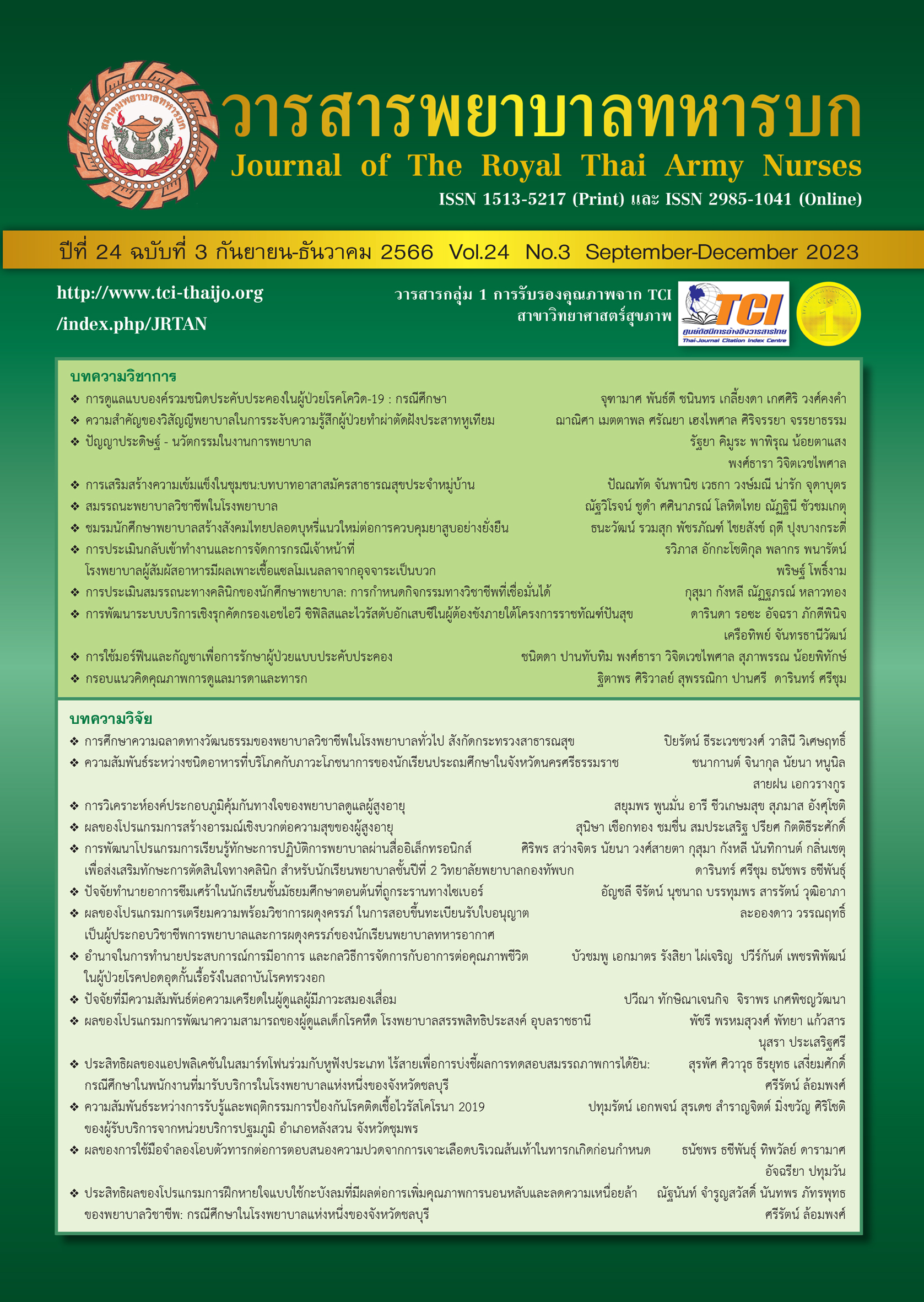Development of Learning Nursing Skill Program via Digital Media to Encourage Clinical Judgement among the Second Year Nursing Students of The Royal Thai Army Nursing College
Keywords:
learning nursing skill program, digital media, clinical judgementAbstract
This study aims to develop learning nursing skills program through digital media which encourages clinical judgement skill among the second year nursing students. 5 Senior experts who verify data to develop learning nursing skill program and the sample consists of 40 second year nursing students. Research Instruments are 1) the quality evaluation form of clinical judgement skill test for intravenous injection 2) the evaluation form of interactive video-based video for practical nursing skill to enhance judgement skill for intravenous injection 3) the quality evaluation form of judgement skill through digital media for intravenous injection.
Learning nursing skill program via digital media which encourages clinical judgement skill consists of 1) The clinical nursing judgement skill test for intravenous injection comprises 3 means : an injection via intravenous set, an injection via intravenous lock and an injection via intravenous infusion, containing 20 questions (ICO = 0.80-1.00) 2) an interactive video-based practical nursing skill to enhance judgement skill for intravenous injection which content validity shows high level (M = 4.40-5.00, SD = 0.00-0.55). Index of difficulty and discrimination of the clinical nursing judgement skill test skill for intravenous injection shows high level (p = 0.43-0.87, r = 0.22–0.85). The quality of judgement skill test shows good (KR-20 = 0.71) and 3) an interactive video-based handout.
The results are the decision- making skill score of sample group shows excellent. The quality of program standard followed by Stufflebeam’s model represents at high level (M = 4.38, SD = 0.82) which shows the quality of learning nursing skill program via digital. The recommendation to the nursing institutes is application in order to encourage clinical judgement as well as advancements in knowledge, skill and attitude in practical nursing for intravenous injection.
Downloads
References
Kanglee K, Lawthong N, Orathai P. Clinical Competency Assessment Model for Nursing Students Based on Miller’s Pyramid Framework Using Entrustable Professional Activities. Journal of The Royal Thai Army Nurses. 2022; 23(2): 468-82. (in Thai)
Supina J. Construction of e-learning courseware on introduction to programming titled data type for Mathayom Suksa 4 Students, Hongsonsuksa School. Graduate School Chiang Mai University: Chiang Mai; 2015. (in Thai)
Müller-Staub M. Teaching nursing diagnoses: Fostering critical thinking. Paper presented at the NANDA-I Latin American Symposium, Brazil. Retrieved from http://kb.nanda. org/article/AA00973/0/Teaching-Nursing Diagnoses%3A-Fostering-CriticalThinking. htm; 2011.
Suwannaparsop C, Sriprasertpapand K,& Onming R. The Development of VDO Interaction Web Application for Learning for Undergraduate Students, Srinakharinwirot University. Journal of Industrial Education. 2019; 13(2): 57-72. (in Thai)
Apinyalungkon K, Juntakun J, Kanyana B, Jaradrattanapaiboon Y,& Meenasantirak A. Transformative Learning: Guidelines for the Development of Clinical Reasoning for Nursing Students. Jornal of Health Research and Development Nakhon Ratchasima Public Health Provincial Office. 2020; 6(1): 16-28. (in Thai)
Nonthamand N. Effects of an Insertion of 5W1H Questions in Lecture Video on Demand via Web 2.0 on Learning Achievement and Problem Solving Ability of Undergraduate Students. Graduate School Chulalongkorn University: Bangkok; 2011. (in Thai)
Nonthamand N. Interactive Videos with Open Learning in the 21st Century. Journal of Education Studies. 2018; 46(4): 211-27. (in Thai)
Berman MG, Kross E, Krpan KM, Askren MK, Burson A, Deldin PJ, Kaplan S, Sherdell L, Gotlib IH, & Jonides J. Interacting with nature improves cognition and affect for individuals with depression. Journal of Affective Disorders. 2012; 140(3): 300-5.
Cohen J. Statistical power analysis for the behavioral sciences. (2nded.), New Jersey: Lawrence Erlbaum Associates; 1988.
Kala S. Development of an electronic learning program for enhancing comprehensive midwifery competency among undergraduate nursing students [dissertation]. Songkhla: Prince of Songkla University; 2009.
Polit DF, & Beck CT. Nursing research: generating and assessing evidence for nursing practice 10thed. Wolters Kluwer Health; 2017.
Sinthuchai S, Chiengta P, Bunsonti N. Clinical reasoning: concept and application for learning and teaching in nursing students. Nursing Journal of the Ministry of Public, 2018; 28(2): 27-40. (in Thai)
Sanitsakul A. Outcomes of blended learning in a nursing technique, Faculty of Nursing, Prince of Songkla University, Pattani Campus. Journal of The Royal Thai Army Nurses. 2023; 24(1): 53-9. (in Thai)
Srijanpal W, Thatan S & Fukfon K. Effects of simulation-based learning on perceived self-efficacy of nursing students in caring for patients with septic shock. Journal of The Royal Thai Army Nurses. 2021; 22(1): 283-93. (in Thai)
Downloads
Published
How to Cite
Issue
Section
License
Copyright (c) 2023 Journal of The Royal Thai Army Nurses

This work is licensed under a Creative Commons Attribution-NonCommercial-NoDerivatives 4.0 International License.
บทความหรือข้อคิดเห็นใดใดที่ปรากฏในวารสารพยาบาลทหารบกเป็นวรรณกรรมของผู้เขียน ซึ่งบรรณาธิการหรือสมาคมพยาบาลทหารบก ไม่จำเป็นต้องเห็นด้วย
บทความที่ได้รับการตีพิมพ์เป็นลิขสิทธิ์ของวารสารพยาบาลทหารบก
The ideas and opinions expressed in the Journal of The Royal Thai Army Nurses are those of the authors and not necessarily those
of the editor or Royal Thai Army Nurses Association.






